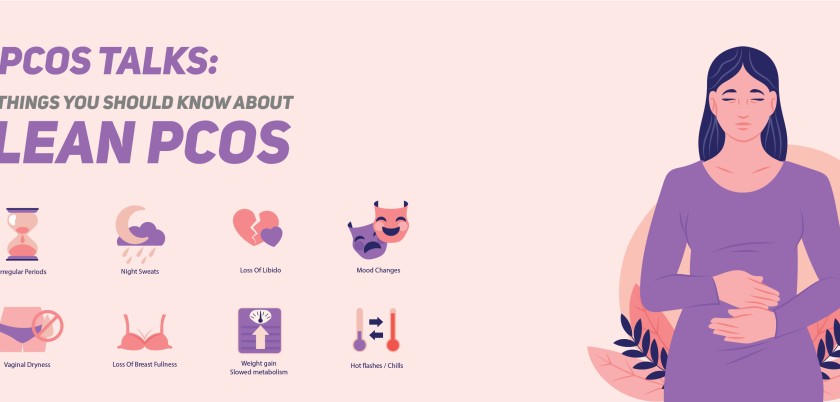
PCOS talks: Things you should know about lean PCOS
PCOS is commonly characterized by obesity and overweight. But are all women with PCOS obese?
Nearly 30% of women with PCOS are found to be of normal Body Mass Index (BMI). Women with lean PCOS have a normal body weight but are equally susceptible to all possible complications caused by this condition.
In this article let us talk about lean PCOS and some tips to manage it.
DIFFERENCES IN SYMPTOMS
In PCOS there is the formation of small cysts in your ovaries causing a constellation of symptoms. These could be infertility, irregular menstrual cycles, acne, mood swings, and hirsutism (excessive hair growth).
In women with lean PCOS these symptoms may or may not be present.
The difference in the presence or absence of a symptom along with a healthy body weight makes the diagnosis of PCOS in lean individuals harder. With a delayed diagnosis, they are prone to develop much more complications.
BODY FAT AND LEAN PCOS
Complications of PCOS do not just stop with BMI but it is critical to understand body fat distribution. Visceral adiposity is the accumulation of fat around your vital organs, which could cause certain metabolic risks.
Researchers have found that women with lean PCOS have an increased amount of this kind of body fat despite normal body weight.
As per National Cholesterol Education Program (NCEP) guidelines, 70% of women with PCOS have dyslipidemia. Studies have found a dip in “good cholesterol” levels and a raise in “bad cholesterol” levels among both lean and obese phenotypes of PCOS.
INSULIN RESISTANCE
Normal body weight does not hold any better advantage for you to not develop insulin resistance. Many research findings show that insulin resistance is common among both obese and lean PCOS individuals.
Researchers have found the prevalence of insulin resistance in lean cases is around 20% - 25%. Insulin resistance can potentially cause type 2 diabetes mellitus, therefore it is important to make immediate amendments to your diet and lifestyle.
TWEAKING YOUR DIET AND LIFESTYLE
A Mediterranean diet with low glycemic foods, good fats, and a moderate intake of animal foods has shown to be beneficial for people with PCOS.
1. Maintaining your weight
Weight maintenance can help you in reducing the risk of various complications like diabetes and heart disease.
2. Consuming a lot of veggies and fruits
Instead of grabbing a sugary delight go for a fruit. Fruits and vegetables are rich in antioxidants which will help you in fighting the inflammatory condition of PCOS.
3. Include good fats
A healthy proportion of good fats from nuts and seeds along with carbohydrates and proteins manage your inflammatory state.
4. Avoid refined carbohydrates
These could hinder your weight maintenance and poses a risk of obesity
5. Get adequate calcium and vitamin-D
Many studies have shown that these nutrients help in restoring normal ovulation and promote hormonal balance.
Progression of PCOS and the effect of outcomes or mostly similar in both groups (obese and lean). A delay in diagnosis of lean PCOS could certainly predispose you to many complications. It is, thus, important for you to be aware of your menstrual cycles and bodily changes.
It is irksome to be diagnosed with PCOS, despite a healthy body weight. But still, with the right diet, lifestyle, and huge emotional support, you can conquer the symptoms and risks.






